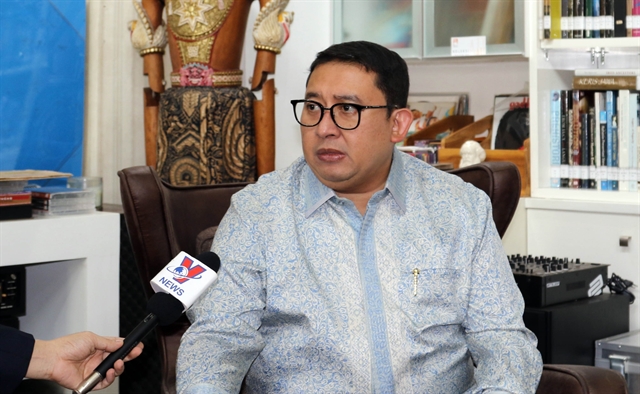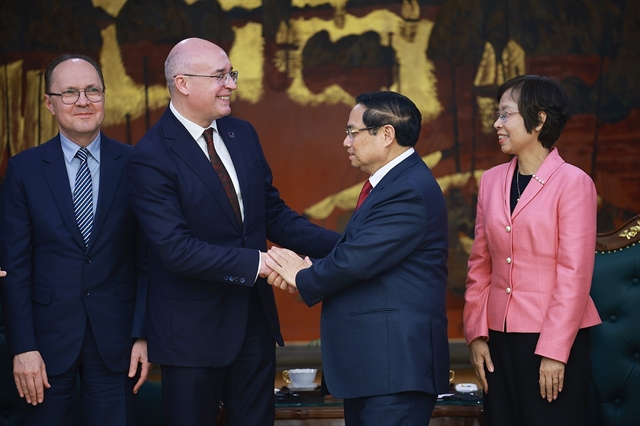 Politics & Law
Politics & Law

While this year’s General Assembly of the ASEAN Inter-Parliamentary Assembly (AIPA) is being held online due to the COVID-19 pandemic, the event would still create great momentum for ASEAN parliaments to redouble efforts for lessening the adverse impacts of the pandemic on livelihoods, stressed Philippines’ Deputy Speaker Raneo Abu and Chairman of the Committee for Inter-Parliamentary Cooperation under the Indonesian House of Representatives Fadli Zo during interviews with Vietnam News Agency.

|
| Chairman of the Committee for Inter-Parliamentary Cooperation under the Indonesian House of Representatives Fadli Zo. — VNA/VNS Photo |
While this year’s General Assembly of the ASEAN Inter-Parliamentary Assembly (AIPA) is being held online due to the COVID-19 pandemic, the event would still create great momentum for ASEAN parliaments to redouble efforts for lessening the adverse impacts of the pandemic on livelihoods, stressed Philippines’ Deputy Speaker Raneo Abu and Chairman of the Committee for Inter-Parliamentary Cooperation under the Indonesian House of Representatives Fadli Zo during interviews with Vietnam News Agency.
The 41st General Assembly of the ASEAN Inter-Parliamentary Assembly (AIPA GA 41) is to be held online on September 9-10. What is the role of this event amid the COVID-19 pandemic, in the spirit of a Cohesive and Responsive ASEAN?
Fadli Zo: As the world today is facing serious global crises of COVID-19 where the pandemic does not know borders – spreading around the world in the same way and affecting people in the same way – it is indeed a stark reminder for our commitment to multilateralism which at the same time becomes an opportunity to strengthen our collective responsibility with a coordinated response, in line with the spirit of a cohesive and responsive ASEAN to achieve a community that is united, peaceful, integrated, and resilient. Our responses will determine how fast the world recovers, and how well we handle this challenge.
For Indonesia, the spirit of mutual cooperation has been central to our efforts in curbing the pandemic. Many people have participated in delivering such humanitarian aids, including money, foods, and other forms of help. And I believe this effort could be amplified at the regional level by the enhanced cooperation and collaboration among AIPA member of parliaments in fighting COVID-19 pandemic.
I believe that AIPA could become the effective platform not only to promote awareness about the impacts of COVID-19 outbreak, but also to generate such joint-efforts and actions on seizing the opportunities and responding effectively to the challenges that we all face nowadays.
Raneo Abu: COVID-19 is a continually evolving and perilous health issue, which so far has eluded quick and enduring solutions by our medical experts and virologists alike, thus, it must be confronted with utmost vigilance, focus and resiliency.
Through AIPA, member parliaments can establish cooperation mechanisms to enable sharing of best practices in fighting the COVID-19 virus with fellow AIPA member states. This will greatly enhance the crafting of common legislation which will strengthen the overall capacity of ASEAN region nations to combat the COVID-19 contagion. Medical data sharing among regional neighbour countries, on the viral transmission behaviour patterns and effective counter-measures, also help in the formulation and refinement of anti Covid-19 programs and policies being implemented. Through these, AIPA provides a ray of hope, survival and recovery by leading the way towards a cohesive and responsive ASEAN region, in this very trying time of near apocalyptic health threats to our very existence in this world.
With the online General Assembly of AIPA scheduled in September of this year, let us find opportunity amid the crisis. The digital connectivity that is now being forced upon us by the pandemic should be viewed as merely hastening the evolution of borderless communities between and among our nations, which is one of our future goals. Without even making a single step beyond our national borders, we are now in a more immediate, cohesive and responsive touch with all our brethren in the region.
How do you evaluate the contribution and the role of the National Assembly of Việt Nam as Chairman of the AIPA in 2020 to enhance a Cohesive and Responsive ASEAN, facing the current regional and international challenges, including the COVID-19 pandemic?
Fadli Zo: The House of Representatives of the Republic of Indonesia fully appreciate the National Assembly of Việt Nam chairmanship of AIPA and as the host of the 41st AIPA General Assembly this year. Under Việt Nam’s leadership, we are confident that AIPA will be able to move forward in the effort to realize a Cohesive and Responsive ASEAN.
The Indonesian House is also assured that the positive outcome documents in this year’s General Assembly reflect common interest of AIPA Member Parliaments that is based on the spirit of ASEAN Centrality, regional security and humanity.
Furthermore, the 41st General Assembly with Việt Nam’s chairmanship symbolises the strong will of AIPA Member Parliaments in encouraging and supporting ASEAN Member States governments to deliver adequate policy in enhancing regional cooperation to curb the spread of COVID-19, to address its adverse impact, and to cope with other regional challenges.
Raneo Abu: The National Assembly of Việt Nam, as AIPA 2020 Chair, under the leadership of Hon. Nguyễn Thị Kim Ngân, capably led AIPA member parliaments in facing the COVID-19 crisis with resolve and determination to overcome, heal and recover as one united, responsive and cohesive region. Acting intrepidly to rally AIPA member states, Chairwoman Kim Ngân, in a March 30, 2020 communication to the heads of AIPA member parliaments, called on the AIPA legislatures to unite in confronting the spectre of the pandemic, which threatened the lives of millions of people in the ASEAN region. She urged AIPA parliaments to join hands in instituting measures and policies designed to coordinate regional efforts in controlling the unprecedented viral outbreak. During the ASEAN leaders interface with AIPA last June 26, 2020, she also stressed the need for a whole of country approach to enable the inclusive healing and recovery of the region.
The House of Representatives of the Philippines highly appreciates the zeal and dedication of the National Assembly of Việt Nam, as manifested by its aforementioned efforts to enable AIPA to contribute in the recovery of the ASEAN region from the impact of Covid-19. We also commend and support its call for the continued crafting of common parliamentary initiatives to sustain and preserve the gains already achieved towards the full implementation of political, economic and socio-cultural community integration by the year 2025.
We express our highest appreciation for the leadership and brotherhood exhibited by National Assembly of Việt Nam during this most difficult chapter of the ASEAN region.
We firmly believe that AIPA 2020 under the helm of National Assembly of Việt Nam will continue to play a major role to make the ASEAN region resilient, cohesive, responsive and undaunted, no matter what challenges we all have to face in the coming years.
What are the cooperation activities between Indonesia's House of Representatives and the National Assembly of Việt Nam in recent years to contribute to promoting the traditional and friendly relationship between the two countries, as well as to enhance AIPA and ASEAN?
Fadli Zo: Indonesia and Việt Nam will be celebrating the 65th anniversary of diplomatic relations on December, this year. Since the era of President Soekarno and President Hồ Chí Minh, Indonesia and Việt Nam remains to be both friends and strategic partners. The relations between both countries shall continue to evolve for more decades to come.
Both countries have also signed Plan of Action on the Implementation of Strategic Partnership 2019-23 which marks the new phase of cooperation as guidance in strengthening bilateral ties. This framework should be maximized through the engagement of all stakeholders especially parliaments, through parliamentary cooperation.
The parliamentary cooperation should be a strategic partner in support of Indonesia-Việt Nam’s bilateral relation. The House of Representatives of the Republic of Indonesia has constituted the importance of parliamentary diplomacy on both regional and global issues. The BKSAP (the Committee for Inter-Parliamentary Cooperation) that I chair is mandated to be a frontline of Indonesian parliamentary diplomacy.
With regards to that aim, The House of Representatives of the Republic of Indonesia together with the National Assembly of Việt Nam has established the bilateral friendship group and multilaterally, the two parliaments have supported each other in parliamentary forums such as AIPA, APA, IPU as well as other relevant forums.
Through this year’s AIPA General Assembly, Indonesia and Việt Nam would voice common concerns over the need to safeguard peace, stability and security based on humanity in the region while enhancing cooperation to curb the spread of COVID-19 and its diverse impact to the people of ASEAN.
What specific proposals will the House of Representatives of the Philippines bring to the 41st General Assembly of the AIPA 41 to enhance the role and the position of AIPA, as well as to accelerate the ASEAN Community building process?
Raneo Abu: The Philippines strongly supports AIPA member parliaments’ initiatives to craft a fast, resilient, and sustainable recovery plan to help bring the ASEAN region back on its feet as well as institutionalizing an effective national preparedness and response mechanisms that would deal with the present and future pandemics. The building up of a truly impregnable health care system and strengthening of a social security system that would provide the widest scope and coverage of the population, most specially the marginalised sector, are also urgent measures during this critical time.
During these new normal times, digital technology plays a very crucial role in facilitating movement of people, goods and services in the region. Thus, it is essential that we review and update existing rules and regulations governing digital technology. To sustain the continued operation of economies, we need to fully optimize and harness the connectivity benefits derived from digital technology.
Micro, Small and Medium Enterprises are the very backbone of ASEAN economies, and they have absorbed harsh and almost unforgiving economic blows. They, however, remain a crucial component for the recovery of the region. In view of this, government assistance through direct pump priming activities are needed to help them survive during this period of economic stress. Financial assistance should also be extended to provide relief to the health, education and agriculture sectors, which in turn can help generate valuable multiplier effect to stimulate the economy.
There is also the need to provide for an institutional framework to educate the Youth of ASEAN, in order to prepare them to effectively respond to both threats and opportunities in the coming days. They are the seeds of the future of the ASEAN region, who we must patiently continue to nurture to enable them to be responsive and resilient as we all face the long and tedious road to recovery.
The COVID-19 pandemic in the ASEAN region has resulted in heightened security measures in our individual and regional territorial borders, in order to restrict the entry of COVID-19 infected individuals. On the same token, ASEAN states should not let their guard down in the campaign to counter the ever growing and evolving threat of terrorism, extremism, radicalism and transnational crime in the region. Joint border patrols should be bolstered and sustained to enable the interdiction of criminal, drug, human trafficking syndicates and radical elements, who continue to exploit to their tactical advantage, the vast and porous marine borders of the region. To further strengthen these efforts, anti-terrorism laws and regulations must be reviewed and updated, in order to incorporate new and modern techniques and approaches in effectively fighting terrorism in the region.
Let there be no mistake, though this pandemic has upended almost every aspect of our individual and collective lives, we will not allow it to force us to abandon our cherished values. Instead, we will re-apply them in the new context so that the end will see us survive this crisis triumphantly! — VNS




